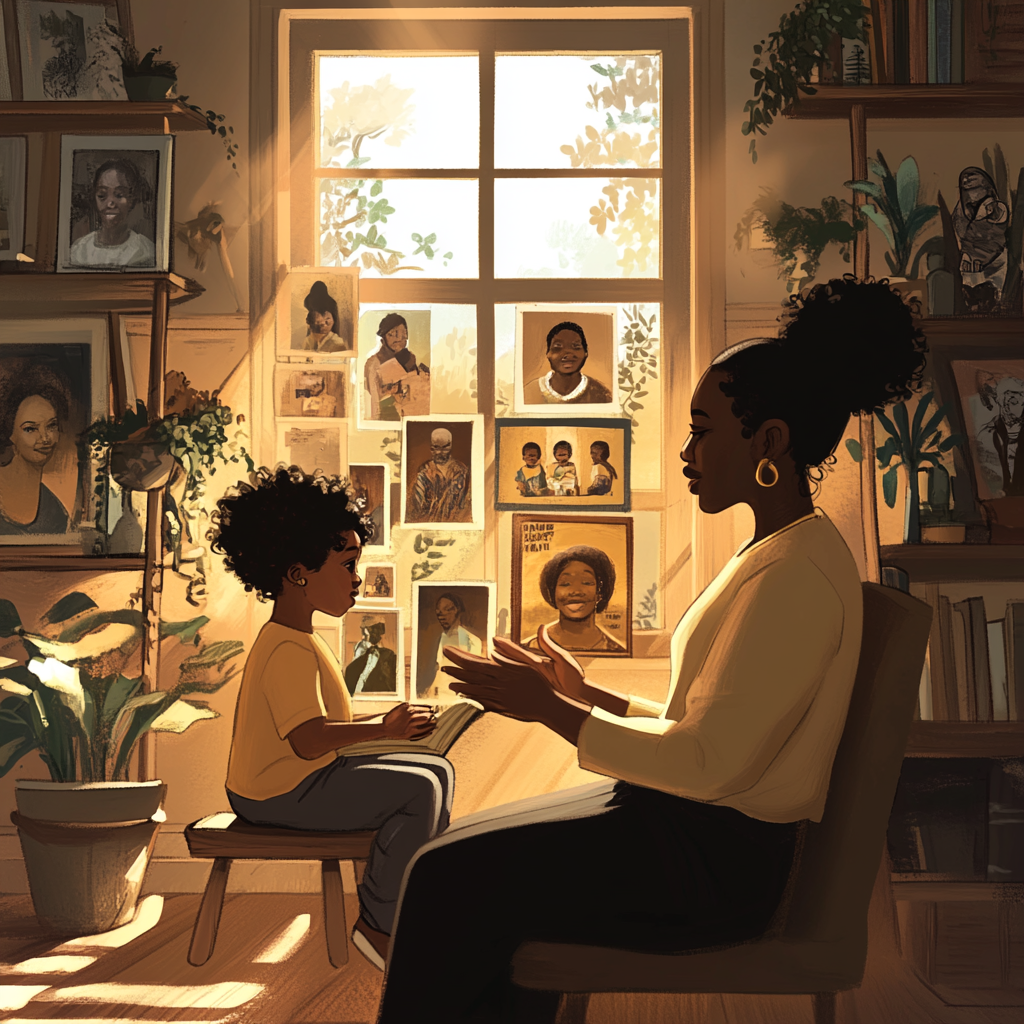Summary
Parental racial socialization plays a critical role in helping Black children navigate a society where race and racism are factors. By teaching racial pride, preparing for discrimination, and engaging in cultural activities, Black parents equip their children with the tools to succeed. This process is vital for fostering self-esteem, resilience, and a strong sense of identity in Black children around the world.

Introduction:
When we talk about parental racial socialization, we’re talking about an intentional and proactive approach that many Black parents take to equip their children for the real world. In a society where race can significantly shape experiences, Black parents often play a vital role in helping their children understand their racial identity and preparing them to thrive in environments where racism exists. Whether it’s promoting racial pride, teaching how to handle discrimination, or fostering individual traits beyond race, this process is essential for building strong, confident, and resilient children.
Growing up, I remember my mother sitting me down to talk about what it meant to be Black, not just in terms of culture and pride, but also how I might be treated differently. Those talks, though tough, gave me the confidence to walk tall in a world that often wanted to box me in. Parental racial socialization is about ensuring our children are ready to face whatever comes their way, armed with pride in their heritage and the wisdom to navigate bias when it arises.
Definition: What Is Parental Racial Socialization?
Parental racial socialization refers to the ways in which parents actively teach their children about race, specifically their own racial identity, and prepare them to deal with a society where racism and discrimination exist. This process involves communicating with children about their heritage, instilling pride in their identity, educating them on how to respond to racial bias, and engaging in cultural activities that strengthen their understanding of who they are.
For Black parents, this socialization is crucial. It’s about more than just giving a child cultural knowledge—it’s about equipping them with the tools to thrive in a world where their race may impact their experiences.
Classification: Key Aspects of Parental Racial Socialization
- Promoting Racial Pride
Black parents often instill a sense of pride in their children regarding their racial and cultural identity. This includes teaching them about their ancestors, historical achievements, and the richness of Black culture globally. Celebrating Black history, embracing African traditions, and discussing influential Black figures all form part of this process. - Preparing for Discrimination
Parents teach their children that while the world is filled with opportunity, there are also challenges, particularly regarding race. This aspect of socialization prepares children for potential experiences of discrimination or racial bias. It’s not about instilling fear, but about empowering them with knowledge and strategies to handle these situations with strength and dignity. - Emphasizing Individual Traits
Another important aspect of racial socialization is teaching children to embrace their unique traits and talents beyond race. While their racial identity is an important part of who they are, it’s equally vital to emphasize their individual strengths, interests, and character traits. - Engaging in Race-Related Activities
From attending cultural festivals to participating in discussions about race, engaging in activities that reinforce racial identity and promote inclusivity is a critical part of racial socialization. These activities help children feel connected to their heritage and develop a healthy understanding of race in a diverse world.
Generalization and Example: Racial Socialization in Action
Think back to family gatherings. For me, it was the stories my grandmother told, the African fabrics we wore, and the pride in our heritage that we celebrated every chance we got. That was parental racial socialization at work teaching me to be proud of who I am while also preparing me for the fact that not everyone would see my identity in the same positive light.
In a study published by the American Psychological Association, researchers found that children who received racial socialization from their parents were more likely to exhibit higher levels of self-esteem and resilience in the face of discrimination. This underscores the importance of preparing Black children for the racial realities they may face, while fostering pride in who they are.
FAQ: Common Questions About Parental Racial Socialization
Q: Why is parental racial socialization important in Black families?
A: It’s crucial because it empowers children to navigate a world where race may influence how they are treated. Parental racial socialization helps children develop a positive sense of racial identity while providing them with tools to respond to potential discrimination.
Q: Is racial socialization necessary for all families?
A: While all children benefit from learning about diversity and equality, parental racial socialization is particularly important in Black families due to the historical and contemporary impacts of racism.
Cause and Effect: The Impact of Parental Racial Socialization on Black Children
The impact of parental racial socialization is profound. When Black parents take the time to instill pride in their children’s racial identity, those children are more likely to have higher self-esteem and better emotional resilience. On the flip side, a lack of racial socialization can leave children feeling unprepared to deal with the realities of racial bias and discrimination.
For instance, studies show that children who are equipped with racial pride and knowledge about how to handle discrimination are less likely to internalize negative stereotypes. Instead, they tend to approach the world with confidence, knowing their worth is not diminished by others’ perceptions of their race.

Comparison/Contrast: African Families vs. African American Families
While parental racial socialization is important across Black communities globally, the way it’s practiced may differ between African and African American families.
- African Families: In many African households, racial socialization may be more focused on cultural traditions, language, and pride in their country’s history. Since many African countries are predominantly Black, the focus is less on preparing for racial discrimination and more on maintaining cultural heritage.
- African American Families: For African American families, there is often a dual focus—instilling pride in African ancestry while also preparing children for the realities of being Black in America, where systemic racism is more pronounced.
Both approaches are essential, but they reflect the unique contexts in which Black families live and raise their children.
List: 5 Key Strategies for Effective Parental Racial Socialization
- Start Early: Begin talking to your children about their racial identity and cultural heritage at a young age.
- Celebrate Black Culture: Make time to attend cultural events, read books, and watch films that celebrate Black history and achievements.
- Prepare for Bias: Equip your children with the tools they need to handle racial discrimination if they encounter it, including how to stand up for themselves in a dignified manner.
- Emphasize Strength Beyond Race: While racial identity is important, teach your children to focus on their personal strengths and talents.
- Engage in Open Dialogue: Create a safe space for ongoing conversations about race, identity, and society. Encourage your children to ask questions and express their feelings.
Sequence: How Parental Racial Socialization Evolves Over Time
As children grow, parental racial socialization evolves. Early on, it may be about introducing cultural pride and traditions. As children enter school and start to experience the world more independently, the focus shifts to preparing them for potential racial bias. In adolescence, conversations may center around how to assert their identity in a world that may challenge it. The goal is to build a foundation early and continue these important discussions throughout their development.
Conclusion: Empowering the Next Generation
Parental racial socialization is one of the most powerful tools Black parents have to ensure their children grow up with pride, strength, and resilience. It’s about more than just teaching our children where they come from it’s about equipping them to navigate a world where race can influence how they are seen and treated. Through promoting racial pride, preparing them for bias, and fostering individual strengths, we empower the next generation to thrive and create positive change.


